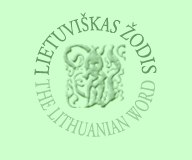- Laurynas IVINSKIS (1808 or
1811-1881), writer and educator, born in Bambaliai, near Uzventis,
county of Mažeikiai. He received a teacher's certificate from the
Kaunas High School in 1847 and taught at different schools, mostly at
the School of Agriculture in Rietavas. He died and was buried in
Milvydai, near Kuršėnai, on July 17, 1881. A monument by the sculptor
P. Aleksandravičius has been erected in
- the town square.
In Lithuanian literary history Laurynas Ivinskis is known for his
calendars, which were the first periodical publications intended for the
Lithuanian peasant and very much liked by them. From 1846-63 he
published 17 calendars, whose circulation reached 8,000 copies. In
addition to the usual calendar material, Ivinskis included helpful
suggestions to the peasants on agriculture, health, items in Lithuanian
history and geography, folklore, poetry and other readings in
literature. He was the first to publish one of the most famous works in
Lithuanian poetry, Anyksčių Šilelis (The Forest of
Anykščiai) by Antanas Baranauskas. He translated, from Polish, and
published E. Young's The Last Day. By1860 he had also translated
the first canto of The Night's Thoughts, by the same author, and
4 cantos of Milton's Paradise Lost, which were not published.
Only in 1897 and 1898, in the United States, the newspaper Tėvynė
(Fatherland) published the translations, considerably edited, of Young's
works. In 1858 Ivinskis published a translation of Genevieve, a
sentimental short story by Ch. Schmidt, which had many editions.
Ivinskis was planning to publish a Lithuanian magazine Aitvaras
(Goblin), but was denied permission by the Russian authorities.
- After the 1863 uprising, when Russians
prohibited Lithuanian books in the Latin alphabet, Ivinskis was engaged
by the government to re-print Lithuanian books in the Russian alphabet.
Four calendars appeared in this manner. When the Lithuanian public
rejected the Russian alphabet thus imposed (see Press Ban), Ivinskis
resigned from his appointment. Laurynas Ivinskis was a man of wide
cultural interests. He wrote a Lithuanian language dictionary, collected
folklore, was interested in the natural sciences, had a herbarium, made
drawings of Lithuanian mushrooms, wrote descriptions of plants. Because
of the unfavorable conditions for cultural activity under the Russian
government, his manuscripts were not published and for the most part
have disappeared.
-
- Bibl.: J. Butėnas, "Laurynas
Ivinskis ir jo kalendoriai," Lietuvių Literatūra, I,
Kaunas, 1964; J. Jurginis, "Ivinskio kalendoriai" in Istorija
ir poezija, Vilnius, 1969.
-
-
Text from the ENCYCLOPEDIA
LITUANICA I-VI. Boston, 1970-1978
-

